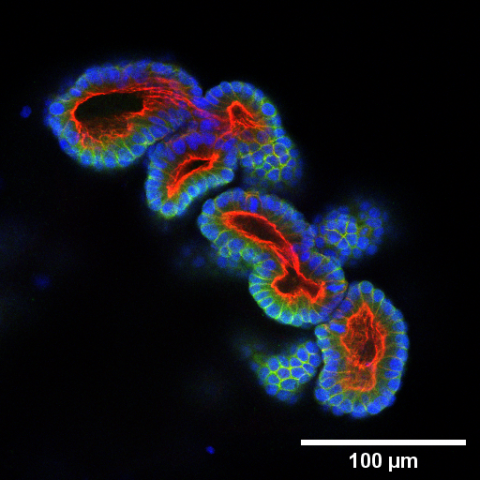
Organoids are new models that reproduce in vitro the cellular complexity, tissue architecture and certain functions of the organs they represent. Organoids are now commonly used in many fields of biology such as nutrition, host-microorganism interactions or toxicology. Organoid models have recently been adapted to farm animals but their characterization remains incomplete (1). In particular, little is known about the ability of organoids to maintain the phenotype of the animals from which they are derived. In this context, we studied whether piglet intestine organoids maintain in vitro the characteristics of their original tissues by analyzing two factors: digestive segment and developmental stage.
We compared the expression of genes involved in the nutritional and defensive functions of the intestinal epithelium in vivo and in jejunum or colon organoids derived from suckling and weaned piglets. Our results show that the characteristic expression profile of the digestive segment is maintained in the organoids for about 50% of the studied genes. On the contrary, the expression profile of genes related to the developmental stage (before or after weaning) is not maintained in organoids. Differentiation of organoids was necessary to observe certain gene expression profiles characteristic of the digestive segment but was not sufficient to induce developmental stage-related differences. Some signals present in vivo and absent in vitro in organoids therefore probably play a key role in the regulation of gene expression in the intestinal epithelium. The characterization of the digestive microbiota and the metabolome of the animals from which the organoids originated allowed us to propose that the absence of luminal environment in vitro (bacteria, metabolites, nutrients) could explain in part the transcriptomic differences observed between organoids and tissues in vivo. Perspectives: Our results show that piglet intestine organoids faithfully reproduce part of the gene expression profiles characteristic of the digestive segment. This property makes it possible to use organoids to study the effects of an experimental treatment (e.g. nutrient, pathogen) in a digestive segment specific manner. This approach was not previously possible with the cell line models classically used in vitro. Nevertheless, our results show that the culture conditions of the organoids could be improved in order to better reproduce the phenotype observed in vivo, in particular in relation to the stage of development. One possibility would be to include in the culture medium nutrients or gut microbiota products specific to the animals studied. The refinement of organoid models in farm animals will eventually contribute to the reduction of live animal experimentation. These experiments on organoids will allow to answer important issues in animal science, such as the search for alternatives to antibiotics to maintain the health of animals. The results obtained were published in the journal Frontiers in Cell and Developmental Biology (2).
References:
1. Beaumont, M., Blanc, F., Cherbuy, C., Egidy, G., Giuffra, E., Lacroix-Lamandé, S., and Wiedemann, A. (2021) Intestinal organoids in farm animals. Vet Res 52, 33
2. Mussard, E., Lencina, C., Gallo, L., Barilly, C., Poli, M., Feve, K., Albin, M., Cauquil, L., Knudsen, C., Achard, C., Devailly, G., Soler, L., Combes, S., and Beaumont, M. (2022) The phenotype of the gut region is more stably retained than developmental stage in piglet intestinal organoids. Frontiers in Cell and Developmental Biology 10
